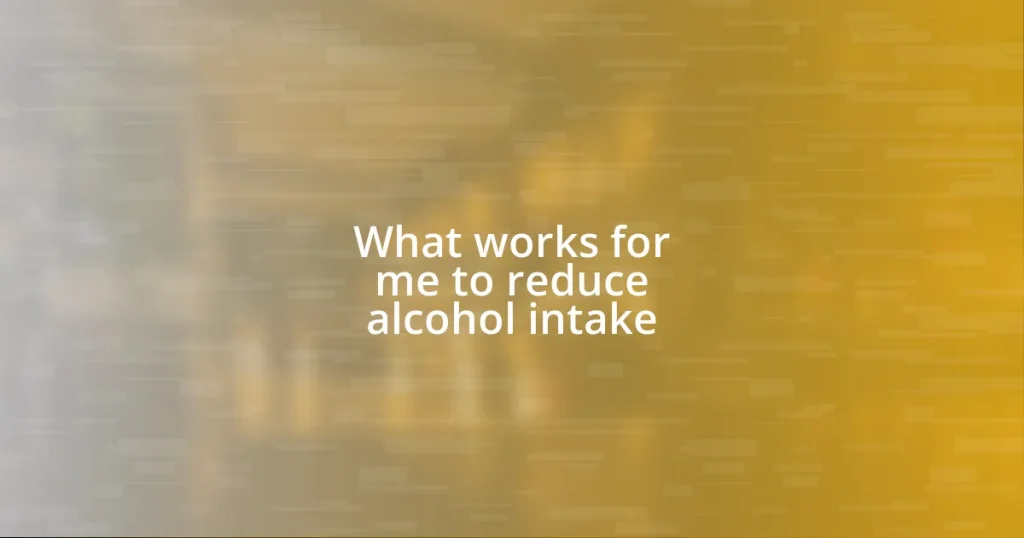Key takeaways:
- Alcohol consumption habits often stem from emotional and social influences, highlighting the importance of understanding personal triggers.
- Setting realistic goals and utilizing behavioral modification techniques, such as cognitive restructuring and self-monitoring, can significantly aid in reducing alcohol intake.
- Incorporating supportive lifestyle changes, including exercise and healthy eating, can diminish cravings for alcohol and promote overall well-being.
- Tracking progress through journaling and using accountability partners or apps can bolster motivation and reinforce commitment to reducing alcohol consumption.
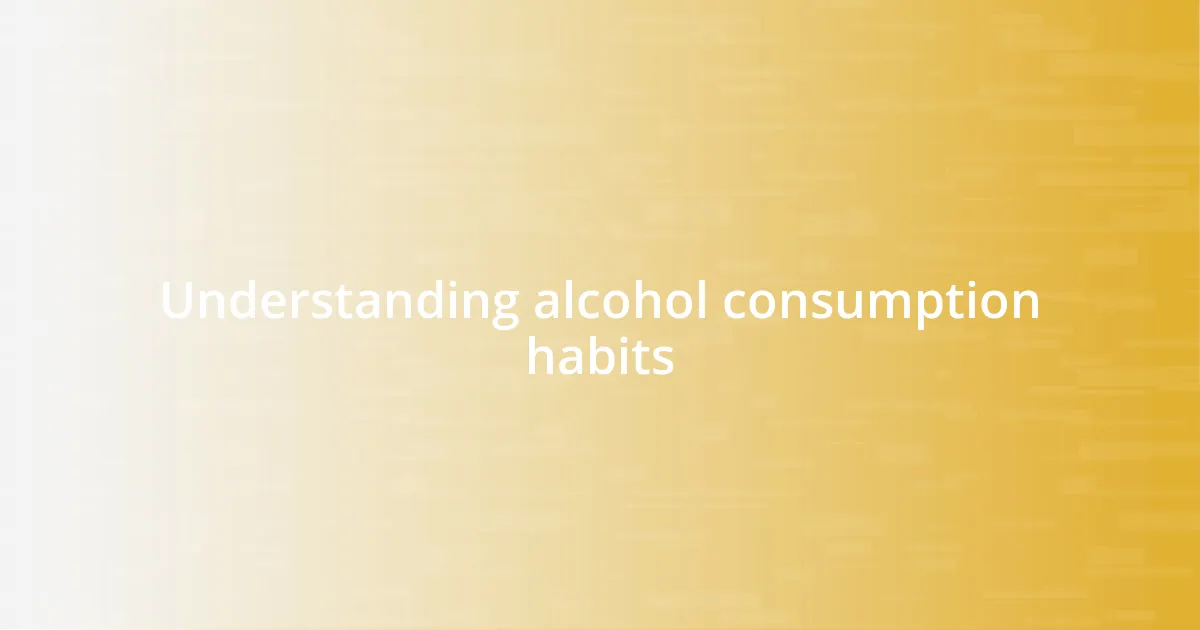
Understanding alcohol consumption habits
Alcohol consumption habits often reflect deeper emotional and social dynamics. For example, I recall a time when I would grab a drink as soon as I got home from work, not necessarily because I craved the alcohol, but because it felt like a reward after a long day. Have you ever found yourself reaching for a glass of wine in a similar situation? It’s interesting to see how our routines can shape our relationship with alcohol, sometimes without us even realizing it.
Many people drink in social settings, linking it to fun or relaxation. I’ve noticed that the atmosphere can heavily sway my choices; when surrounded by others enjoying drinks, it’s easy to join in. But this has made me reflect: is it the drink that makes the moment enjoyable, or is it the company? Understanding the motivations behind our drinking habits can reveal a lot about our social influences and personal triggers.
On a quieter note, I’ve discovered how my mood plays a significant role in my drinking choices. There were nights when I sought out a drink to cope with stress, only to wake up feeling regret the next morning. This cycle made me ponder: could alternative coping strategies, like a good book or a morning jog, provide the same comfort without the negative fallout? Recognizing these patterns has been key in shifting my approach to alcohol.
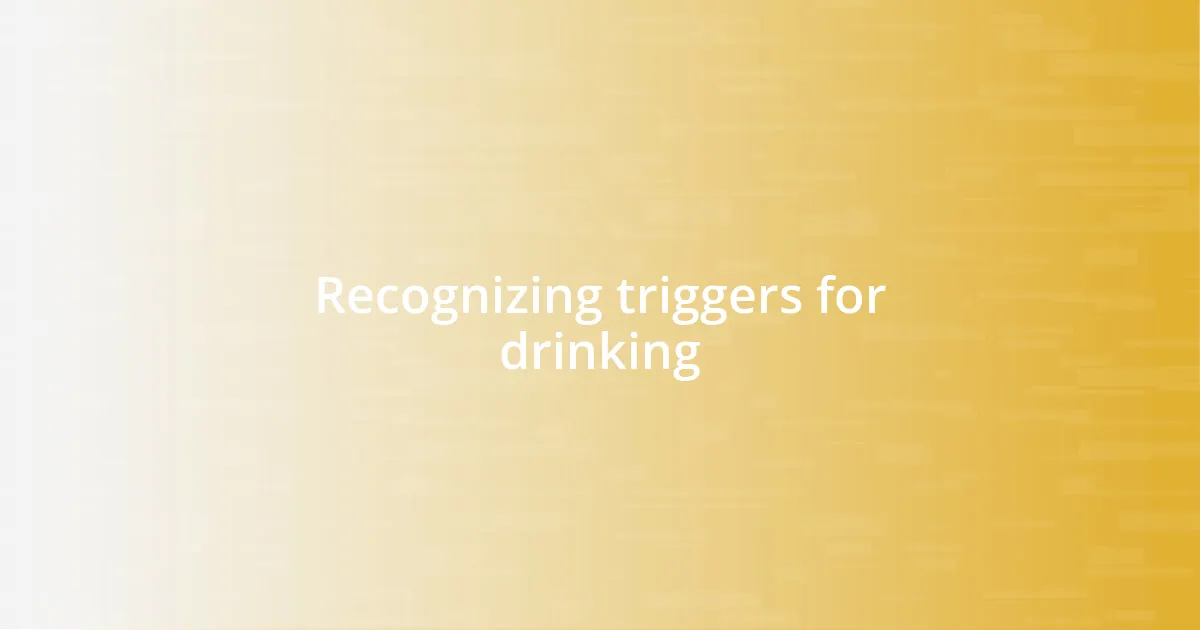
Recognizing triggers for drinking
Recognizing the specific triggers that lead me to drink has been a game changer. One particular evening, I found myself feeling lonely after a long week. Instead of reaching for the usual bottle of wine, I decided to call a friend instead. That simple act of connection reminded me that engaging with others could be just as fulfilling without relying on alcohol. It’s those moments of realization that have helped shift my perspective on drinking.
I’ve also noticed how certain environments can heighten my desire for a drink. For instance, I used to visit my favorite bar, where the lively music and vibrant atmosphere would pull me in. I realized that the ambiance amplified my urge to indulge. It made me ask myself: am I enjoying the company or just the context? Understanding this has helped me choose more mindful environments, like coffee shops or parks, to hang out with friends instead.
Lastly, I’ve come to terms with how stress and anxiety act as significant triggers for me. There were nights when I would pour myself a drink to unwind after a long day. I remember one evening feeling overwhelmed, only to sip my drink slowly and still feel anxious. This made me question whether the alcohol truly helped. Embracing new stress relief methods, like meditation or crafting, has proven more effective and rewarding in addressing those feelings.
| Trigger Type | Example Experience |
|---|---|
| Emotional State | Feeling lonely led me to seek connection via a call instead of a drink. |
| Social Environment | The bright bar made me crave drinks rather than enjoy the company. |
| Stress Relief | Pouring a drink didn’t ease my anxiety; I found meditation more beneficial. |
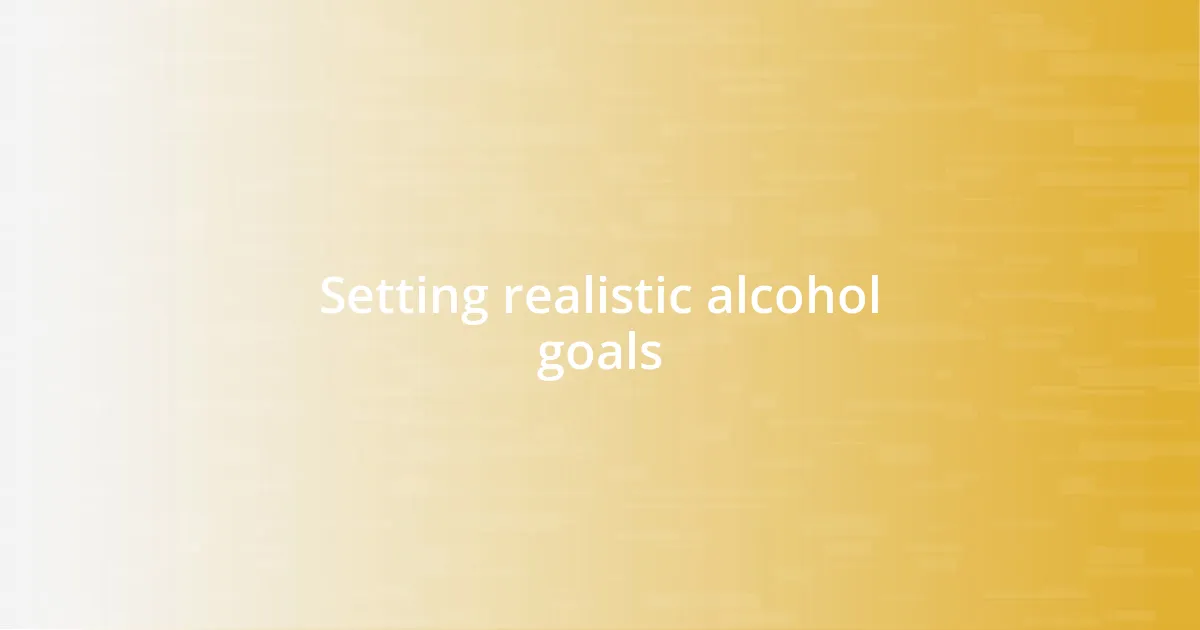
Setting realistic alcohol goals
Setting realistic goals for reducing alcohol intake is essential for creating sustainable change in our lives. From my experience, it’s crucial to start small. I once declared a month with zero alcohol, only to feel defeated by the end. Instead, I’ve found success by setting modest, achievable goals, allowing room for growth and adjustment.
Here are some effective strategies I’ve utilized for setting those goals:
- Define Your Why: Reflect on why you want to cut back. For me, it was about wanting to feel more energetic and focused.
- Set Specific Limits: Instead of saying “I’ll drink less,” I started by quantifying it—like limiting myself to two drinks on weekends.
- Stay Accountable: Sharing my goals with a friend created a supportive environment, which helped me stay committed.
- Celebrate Small Wins: I’ve learned to acknowledge even the smallest victories, like a week without a drink, reinforcing my motivation.
- Be Flexible: Life happens. If I slip up, I remind myself it’s part of the journey, not a failure.
Ultimately, I believe that these personalized goals should reflect my lifestyle and values, making the journey toward reduced alcohol intake feel empowering rather than restrictive. Each step forward is progress worth celebrating, and I encourage you to find what resonates with you.
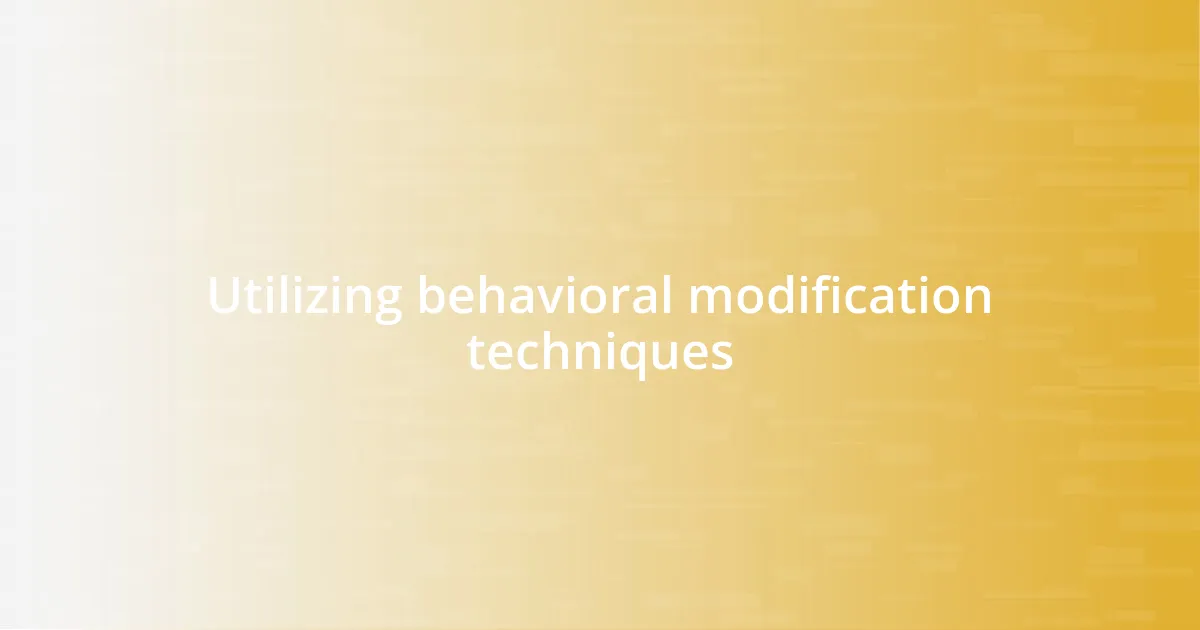
Utilizing behavioral modification techniques
Utilizing behavioral modification techniques has been instrumental for me in managing my alcohol intake. One technique that resonated with me was cognitive restructuring, which involves changing the way I think about drinking. I often found myself associating alcohol with relaxation after a hard day. Once I recognized this, I challenged that thought and started replacing it with the idea that I could unwind through a warm bath or a good book instead. It’s amazing how shifting those thought patterns made alternatives more appealing.
Another strategy that I’ve integrated is the use of self-monitoring. I began journaling my drinking habits, which provided me with a clear picture of when and why I reached for a drink. For instance, I noticed that I often drank when I was bored. By identifying this pattern, I made a conscious effort to find other activities—like going for a jog or cooking a new recipe—to fill that void. Have you ever noticed how powerful awareness can be in altering behavior? I can confidently say that my awareness helped me create healthier habits, making me feel more in control.
Social situations also call for behavioral techniques. I remember attending a party where the atmosphere felt charged with anticipation for drinks. Instead of following the flow, I developed a strategy of always having a non-alcoholic beverage in hand. It was my little psychological trick to feel included without the urge to drink. I’d often reflect on my decision to choose sparkling water over wine and feel proud. It taught me resilience and the power of personal choice in the face of social pressure. How do you navigate social scenarios without succumbing to the urge to drink? I’ve learned that a proactive approach can make all the difference.
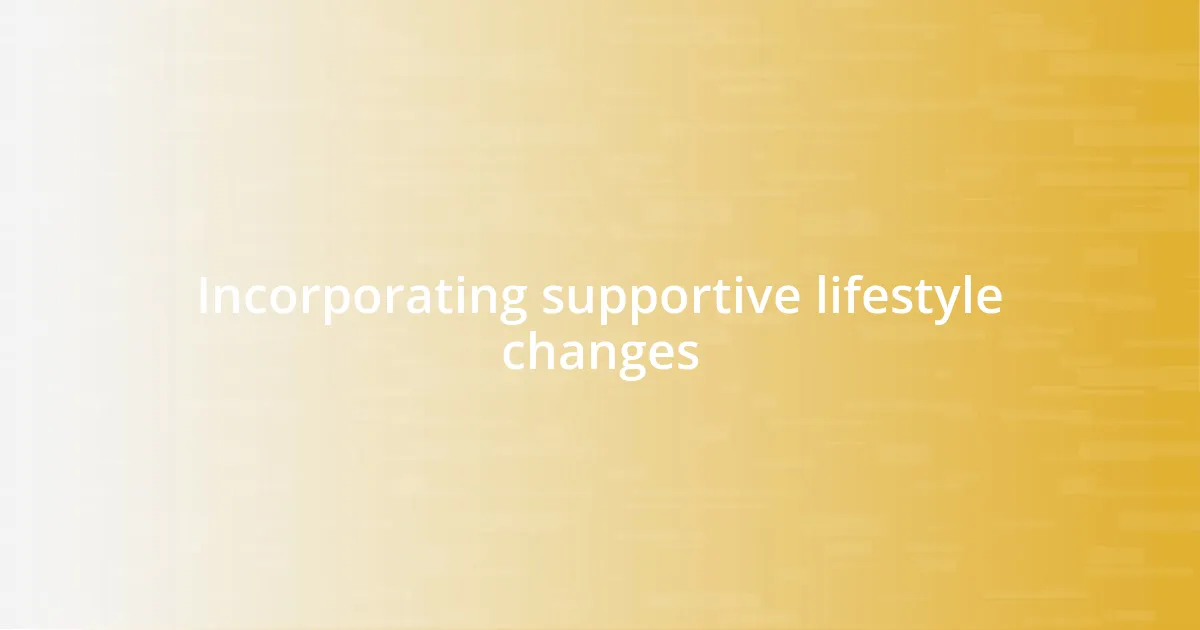
Incorporating supportive lifestyle changes
Making supportive lifestyle changes can significantly enhance my journey in reducing alcohol intake. I remember when I decided to adopt a more active lifestyle; it became a game changer. By incorporating regular physical activities like jogging or yoga, I found that my cravings for alcohol diminished. The endorphins released during exercise genuinely uplifted my mood, filling that void I once sought to fill with a drink. Have you ever noticed how much better you feel after moving your body? It’s like a natural high that’s far more satisfying than a nightcap.
Another noteworthy adjustment I made was in my dietary choices. When I decided to eat healthier—more fruits, veggies, and whole grains—I realized my body felt fresher and more energized. This made me less inclined to reach for alcohol, as I began associating my newfound vitality with nourishing choices rather than boozy ones. I like to think of this as a holistic approach: when one area of my life improves, it often cascades into other areas. Have you considered how nutrition impacts your cravings?
Lastly, reaching out and surrounding myself with a supportive community has been vital. I began joining local groups focused on wellness and moderation. Connecting with others on similar journeys created a sense of camaraderie that I never expected. Sharing stories and strategies not only held me accountable, but it also inspired me to keep pushing forward. I often reflect on our discussions about sober social events, and I find joy in the new memories we create. Have you thought about who your support network is? Engaging with others can make each step feel lighter and more achievable.
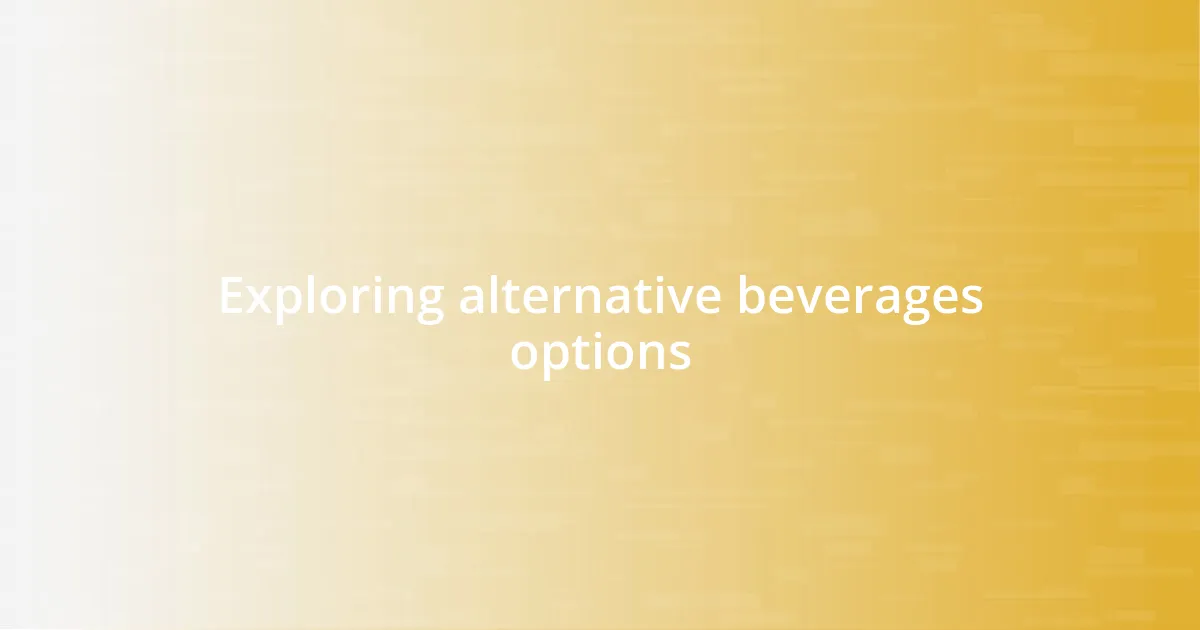
Exploring alternative beverages options
Exploring alternative beverages options has been a fun and eye-opening journey for me. I vividly recall the first time I tried a delicious mocktail at a friend’s gathering. It was a vibrant mix of fresh fruit juices and sparkling water, garnished with herbs—and honestly, I hardly missed the alcohol. Trying out non-alcoholic beers and craft sodas opened up a whole new world of flavors that I now genuinely enjoy. Have you ever thought about how many tasty, alcohol-free options are out there waiting to be discovered?
I’ve also learned to appreciate herbal teas as a soothing alternative, especially in the evenings. At first, I was skeptical about how satisfying they could be, but now, a cup of chamomile or mint tea feels like a cozy ritual. There’s something calming about brewing it slowly, allowing the aroma to fill the room. Plus, it keeps me engaged with a calming activity rather than reaching for a drink out of habit. What experiences do you have with warm beverages as a substitute?
Another delightful surprise was experimenting with fruit-infused waters. One summer, I decided to create my own blends using whatever fresh fruits and herbs I had on hand. Lemon and basil became a personal favorite—crisp and refreshing, it transformed my hydration routine. It’s incredible just how a little creativity can replace the urge for alcohol, making each sip feel like a treat rather than a restriction. Have you tried infusing your water? It adds a splash of excitement that makes it all worthwhile.
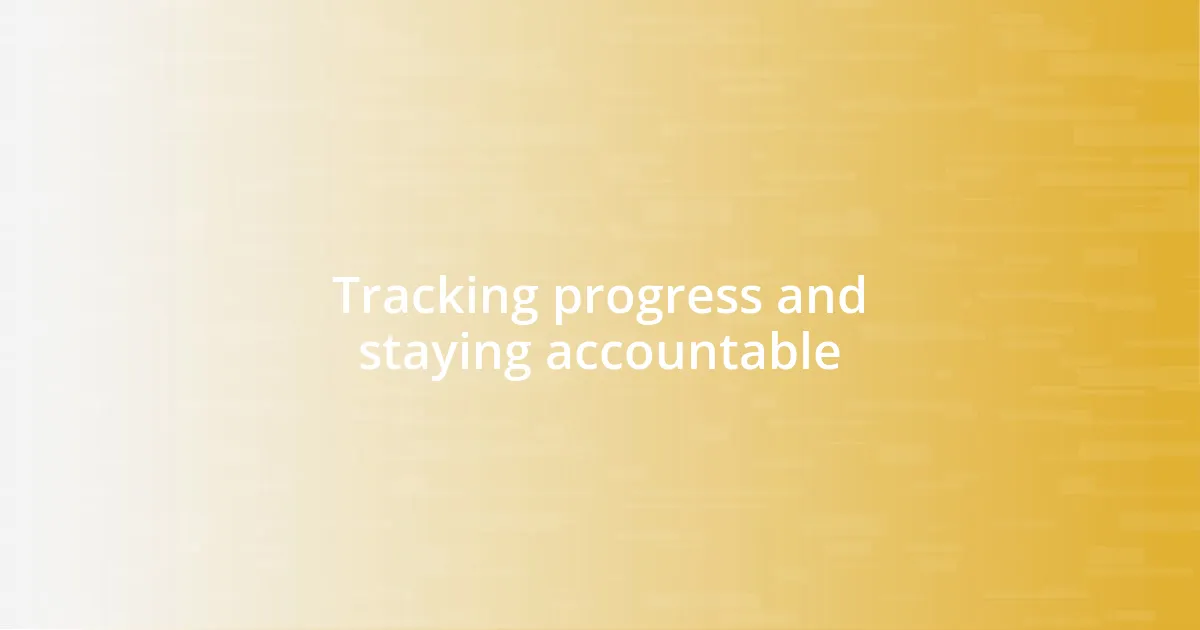
Tracking progress and staying accountable
Tracking my progress has been essential as I work to reduce my alcohol intake. I started keeping a journal, jotting down my feelings and the occasions when I chose to skip a drink. Reflecting on those moments not only reinforced my commitment but also allowed me to celebrate small victories. I remember one week where I didn’t drink at all on two social outings; it felt empowering. Do you track your milestones? It’s remarkable to witness your own growth.
Accountability has transformed my experience, and I found that sharing my goals with a trusted friend helped immensely. We check in on each other regularly, sharing our successes and challenges. There have been nights when I felt tempted, and just sending a quick message for support has made all the difference. Have you considered finding someone to be your accountability partner? That connection can create a deep sense of responsibility that motivates you to stay on track.
Using apps to monitor my drinking habits has also been a revelation. I vividly recall the first time I logged my drinks and saw the data laid out in front of me; I was shocked at how often I had indulged without realizing it. This visual representation of my habits has motivated me to set clear goals. Now, each time I hit a milestone, I feel a wave of pride wash over me. Do you think technology could help you in your journey? The insights gained from tracking can light the way to healthier choices.










